Graffiti Bridge Blu-ray Movie
HomeGraffiti Bridge Blu-ray Movie 
Warner Bros. | 1990 | 90 min | Rated PG-13 | Oct 04, 2016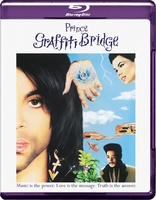
Movie rating
5.4 | / 10 |
Blu-ray rating
| Users | 0.0 | |
| Reviewer | 2.0 | |
| Overall | 2.0 |
Overview
Graffiti Bridge (1990)
In a sequel of sorts to Purple Rain, Prince struggles musically with Morris Day for control of the nightclub that the two co-own in this dramatic musical fantasy.
Starring: Prince (I), Ingrid Chavez, Morris Day, Jerome Benton, Michael BlandDirector: Prince (I)
| Music | 100% |
| Musical | 65% |
| Surreal | 21% |
| Fantasy | 13% |
Specifications
Video
Video codec: MPEG-4 AVC
Video resolution: 1080p
Aspect ratio: 1.78:1
Original aspect ratio: 1.85:1
Audio
English: DTS-HD Master Audio 2.0 (48kHz, 24-bit)
Spanish: Dolby Digital 2.0
Subtitles
English SDH, French, German, German SDH, Japanese, Spanish
Discs
Blu-ray Disc
Single disc (1 BD)
Playback
Region A (B, C untested)
Review
Rating summary
| Movie | 1.0 | |
| Video | 4.0 | |
| Audio | 4.0 | |
| Extras | 0.5 | |
| Overall | 2.0 |
Graffiti Bridge Blu-ray Movie Review
Return of The Kid
Reviewed by Michael Reuben October 8, 2016Even Prince's most devoted fans are hard-pressed to defend Graffiti Bridge (or "GB"), the pop
phenomenon's fourth and last film, which landed in theaters with a resounding thud in November
1990. After the experience of helming Under the Cherry Moon when the original
director left the project, Prince extended the same mantle of control over his film projects that he exercised in the
recording studio. His next directing project was the concert film, Sign o' the
Times, which is the only Prince film not in Warner's library. For GB, he not only directed but also wrote the
screenplay. While GB is nominally a sequel to Purple Rain, it's obvious from the final product
that Prince was aiming for something more than just the next chapter in his fictional biography.
The result is a mess, but, as with most of Prince's misfires, it's still interesting.
For Warner's three-film
Prince Movie Collection, the studio has newly transferred GB to give this bizarre artifact of a unique career a quality Blu-ray
presentation. (The disc is also available separately.)
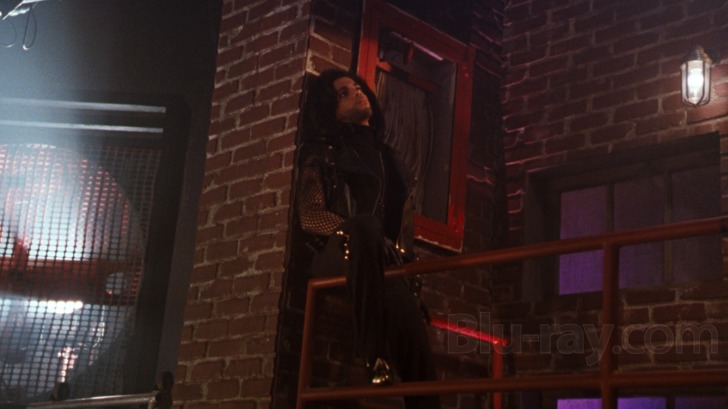
GB returns to Prince's Purple Rain character, The Kid, after the events of the first film—or at least that's what we're supposed to accept. In fact, nothing in GB remotely resembles the urban reality of Purple Rain's Minneapolis, but several familiar faces occupy the landscape. The Kid's former nemesis, Morris Day, is now a preening mogul who controls most of the town's entertainment. Still attended by his faithful sidekick, Jerome (Jerome Benton), and still serving as front man for his band, The Time, the Morris of GB vacillates wildly between the familiar clown from Purple Rain and a more sinister character with gangster aspirations. Following the death of former owner Billy, control of the First Avenue club has been split equally between Morris and The Kid, thereby guaranteeing perpetual animosity despite their apparent reconciliation at the end of Purple Rain.
The Kid is still obsessed with the legacy of his late father, to whose spirit he writes letters, but the woman who was supposed to be the love of his life, Apollonia, has been erased from history. In her place, The Kid has paired up with Jill (Jill Jones), the First Avenue waitress who mooned over him throughout Purple Rain and has, to all appearances, finally got her man. But where women are concerned, The Kid remains as fickle as ever. When a new one appears with the suggestive name of "Aura" (Ingrid Chavez), he immediately lets Jill drop. (Morris quickly scoops her up.)
The relationship that develops between The Kid and Aura is more spiritual than sexual, because Aura isn't so much a woman as an angel (or a muse or a sprite—take your pick). Her supernatural quality is suggested both by her running voiceover and by her habit of fading in and out of the frame, sometimes reappearing with entirely different clothing, makeup and hair. The mystery that Aura exudes is central to GB's effort to convey a sense of divine presence watching over The Kid and those around him. Aura is the "bridge" of the title, whose mission is to heal the rifts in the town's musical community (although the film does feature an actual bridge covered with graffiti that is more of a sculpture than a roadway). Where Purple Rain was a story about one man's reckoning with the emotional legacy of a troubled family, GB has the grander ambition of saving the whole world (or at least the Minneapolis club scene) through love, music and sacrifice. Just as the arc of Aura's character suggests a transcendence of earthly concerns, the film's musical performances repeatedly evoke a revivalist spirit of conversion and discovery, with rhythm and melody providing a pathway to the divine.
Those are big ideas, and dramatizing them would be a tall order for any film, but GB offers only warmed-over story beats from Purple Rain, as Morris and The Kid once again battle for both musical supremacy and the heroine's affections. In Purple Rain, Prince could rely on co-writer/director Albert Magnoli to provide him with a coherent (if cliched) plot line, freeing the musician to focus on the emotional content that his compositions so richly supplied. Prince has no such support in GB, which suffers from weak exposition and haphazard plotting, so that the musical interludes don't land with the same force. (Imagine how "Darling Nikki" would have played in Purple Rain, if Magnoli hadn't laid the necessary foundations of the relationship between The Kid and Apollonia.) It doesn't help that the film's songs rarely achieve the heights that Purple Rain hit repeatedly. Despite an impressive array of performing talent, including George Clinton and Melody Staples, the soundtrack is mostly forgettable, leaving the film to meander for almost half its running time before we encounter a number with an infectious hook. Appropriately enough, the song is the explicitly religious "Thieves in the Temple".
GB also labors under bizarre visual choices. Presumably in an effort to reinforce the story's otherworldly elements, the production design mostly avoids the realistic urban setting that worked so effectively in Purple Rain, replacing it with streets and alleys that look like extensions of club interiors, thereby giving literal expression to the notion that "All the world's a stage". Unfortunately, the result has the artificial look and feel of an extended music video, which ends up trivializing the film's big themes and the profound emotions that Prince so obviously wants to evoke. In the recording studio and on stage, he could get away with being elliptical, coy and suggestive, but cinema doesn't work that way. A film has to build a world that the audience can inhabit, and GB's world never comes into focus.
Graffiti Bridge Blu-ray Movie, Video Quality 
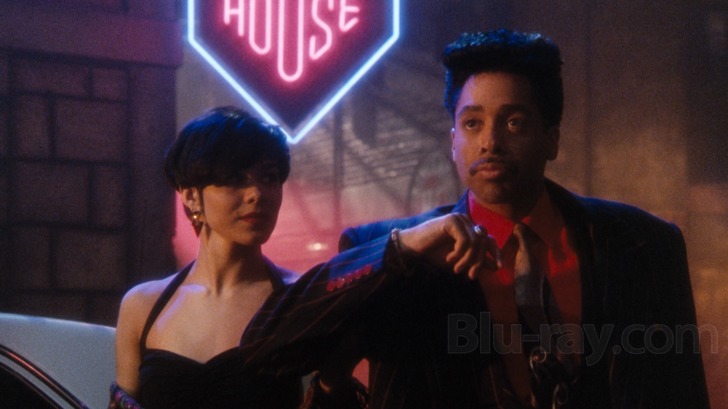
One cinematic lesson that Prince learned from the experience of Purple Rain is the importance of a first-rate cinematographer. Graffiti Bridge was shot by Hollywood
veteran Bill Butler, whose eclectic résumé includes Jaws, the first
three Rocky sequels and Hot Shots! Butler obviously studied Donald E. Thorin's lighting for Purple
Rain, because GB features the same heavy use of smoke and haze with floods of bright, colored light, mostly blue and red. Although
GB was shot six years after Purple Rain, when film stocks had significantly improved, the lighting and
production design give it much of the same soft texture as the earlier film.
For this 1080p, AVC-encoded Blu-ray, Warner's Motion Picture Imaging has scanned an
interpositive at 2K, followed by color correction guided by an answer print. The result is a
vividly colorful image that is as detailed as the gimmicky lighting allows. The film has a natural-looking grain texture that is noticeably finer than
Purple Rain's, but the grain is still heavy
enough that it may be a distraction for some viewers. Still, the look is true to the source and
deserves high marks for accuracy. The rare scene in outdoor daylight reveals a tighter, clearer
image that confirms the deliberateness of the many softer sequences featuring musical
performances. A number of scenes depicting the antics of Morris and Jerome occur in brightly lit
interiors, and these also offer superior sharpness and detail. Warner has mastered GB at a high
average bitrate of 32.98 Mbps.
Graffiti Bridge Blu-ray Movie, Audio Quality 
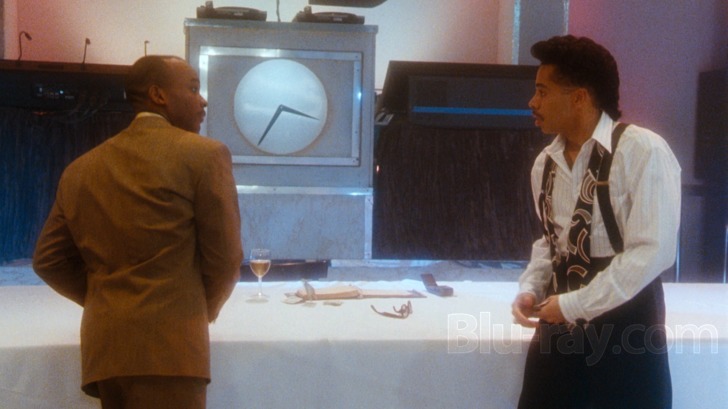
GB's theatrical Dolby Surround track has been encoded in lossless DTS-HD MA 2.0, and it serviceably reproduces the musical numbers but is otherwise nothing special. The dynamic range is somewhat wider than the 5.1 remix on Purple Rain, and the highs haven't acquired the kind of harshness that sometimes results from pulling apart a stereo track to re-encode it for 5.1. The dialogue is mostly intelligible; Morris Day still can't resist slurring his words for effect, but that's not the fault of the soundtrack.
Graffiti Bridge Blu-ray Movie, Special Features and Extras 
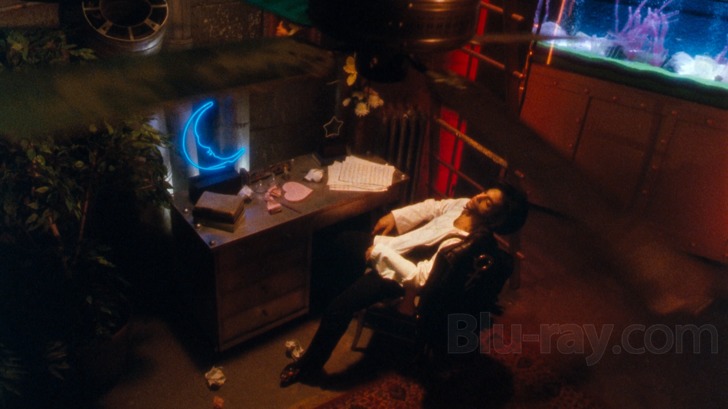
The sole extra is the film's trailer, which has been remastered in 1080p (1.78:1; 1:48). Missing are the four music videos that appeared on Warner's 2004 DVD of Graffiti Bridge.
Graffiti Bridge Blu-ray Movie, Overall Score and Recommendation 
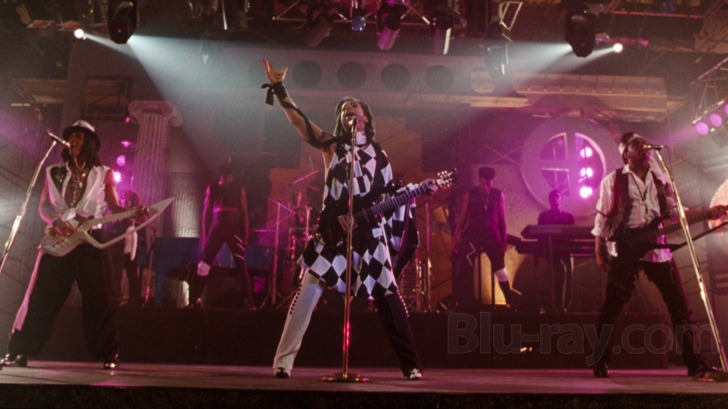
Prince abandoned cinema after Graffiti Bridge and refocused all his efforts on writing and
performing music. I doubt that anyone other than diehard fans will have the patience to sit
through the film, but those who can tolerate its many missteps will be rewarded with tantalizing
glimpses of an artist in transition, searching for a direction that he would ultimately find in the
medium where he was most at home. Warner's Blu-ray presentation is faithful, but I'm not
making any recommendations. Enter at your own risk.
Similar titles
Similar titles you might also like

Under the Cherry Moon
1986

Purple Rain
1984

Giuseppe Verdi: La Traviata
Teatro alla Scala
2007

Spinout
Warner Archive Collection
1966

A Hard Day's Night
1964

Not the Messiah (He's a Very Naughty Boy)
2010

Clambake
1967

Big Easy Express
2012

Rappin'
1985

Yellow Submarine
The Beatles
1968

Magical Mystery Tour
The Beatles
1967

The Blues Brothers 4K
40th Anniversary Edition
1980

A Chorus Line
1985

Michael Jackson Moonwalker
1988

Help!
The Beatles
1965

The Apple
1980

Original Cast Album: "Company"
1970

Rocketman
2019

Kylie Minogue: Kiss Me Once - Live at the SSE Hydro
2014

Kylie Minogue: Kylie X 2008
2008